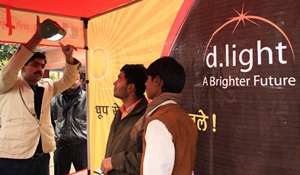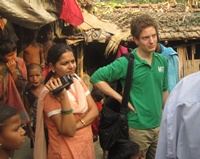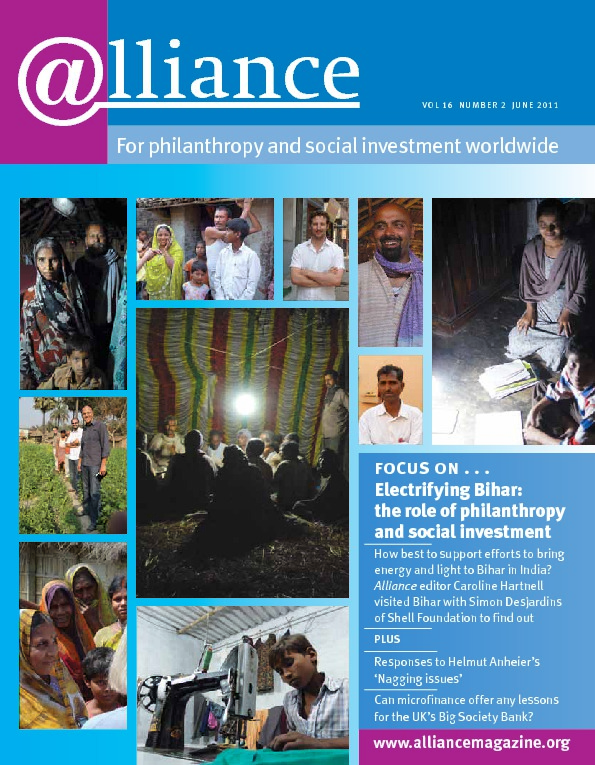What are the main challenges for social entrepreneurs working on clean energy in India as they try to scale up their operations? One is clearly access to funding, though this seems to vary a lot according to the stage of development of the organization seeking funds. Finding the right people, and enough of them, seems to be a universal challenge. Other issues are the lack of consumer finance, the lack of support organizations and an unfriendly regulatory environment.
Is funding a problem?
How much of a problem is access to funding? To some extent, the answer depends who you are. For what Pejman Altafi of Voxtra refers to as ‘Showcase successes like Husk Power and d.light’, funding may be less of a problem. The newer but already well-regarded Greenlight Planet clearly has investors interested in its current fundraising round. Often the founders of these organizations were educated in the US and have been able to make good use of connections there. ‘It’s much harder for those less well connected to get investment finance,’ says Sarah Butler-Sloss of the Ashden Trust.
How much of a problem is access to funding? To some extent, the answer depends who you are.
But for a very new organization like ONergy, established in 2009, funding is clearly an issue. ONergy is still in the start-up phase, which means that it is difficult to attract funds even from social investors, which tend to fund only in the growth phase. It would benefit from the injection of a grant ‘to strengthen the concept in order to attract investors’ and from some long-term patient capital, says co-founder Vinay Jaju.
There is consensus among the investors, too, that the inadequate number of seed funders is a great problem. According to Ross Baird of First Light Ventures (part of Gray Ghost), out of 50 or so impact funds in India, only three or four will make investments of less than $250,000. Richenda Van Leeuwen of the UN Foundation also talks of the need for more seed capital, especially for women entrepreneurs who often don’t have access to ‘friends and family’ networks for early-stage funding. Pejman Altafi of Voxtra, Chris West of Shell Foundation, Keith Allman of Bamboo Finance, Vineet Rai of Aavishkaar – all emphasize the need for early-stage investment. ‘Impact investors will want proof of concept and a strong management team,’ says Neera Nundy of Dasra – and support is needed to bring enterprises to this stage.
Not all social enterprises want social investment. Gaurav Mehta of Dharma says he doesn’t want to raise venture capital funds because of potential conflicts with their social mission. At present they have family funding and funding from Shell Foundation.
On the other hand, a social enterprise like Project Dharma was launched using family funds. Additional funding, like that from Shell Foundation, is needed for capacity building and proof-of-concept. Gaurav Mehta stresses the importance of ensuring that the criteria for selecting partners for funding are aligned with the core mission.
The role of grants
It should also be remembered that Husk Power would not be where it is now without initial support from Shell Foundation – an investment totalling around $2 million in all, not to mention capacity-building support over the last few years. Jacqueline Novogratz of Acumen Fund refers to Shell Foundation as the ‘unsung hero’ of this story. ‘Their early support enabled Husk Power to survive and develop to the point where they were attractive to investment,’ she says.
Organizations giving grants to clean energy social enterprises in India are unfortunately thin on the ground. Shell Foundation, the Ashden Trust and the Lemelson Foundation are notable exceptions. All three offer capacity-building support and help structuring the business as well as funding. One valuable role for grant funding is to support ongoing R&D. ‘Funding specifically for research and development to get the right product would produce faster growth,’ believes Anish Thakkar of Greenlight.
In the long term, carbon finance is another potential source of funding. But this is mainly reaching ‘big industrial players with no impact on poverty’ says Sarah Butler-Sloss. Getting it takes a lot of time and effort, she says. It is on the agenda for Husk Power, says CEO Gyanesh Pandey.
Human resource constraints
But while funding is not a constraint for all organizations, human resources appears to be – whatever the stage of development. ‘Bihar badly lacks professionals,’ says Pandey. ‘People get out of the state if they can, leaving a vacuum of real talent. So we have to find new talent and try to make our own professionals – which is why we’re committing more than $1 million to building our training programme.’
According to Anish Thakkar, Greenlight Planet got around the absence of technical and professional expertise by opting to sell high-quality solar lights rather than embarking on electrification. The experience of installing a bio-diesel generator in a village in Orissa convinced them that what was needed was ‘quite simply light from a source that didn’t require maintenance’.
However, Greenlight now wants to expand to 20 or 30 times the present size. Clearly less training is required for saathis (sellers) and the people who manage them than for the operators, mechanics and engineers required by Husk Power. Even so, finding people to sell its products and manage its growing network will be a challenge for Greenlight. According to Vinay Jaju, ONergy’s ability to expand according to plan depends not only on finance but also on developing the capacity of people in its team to lead the expansion. John Howard of Duron Energy also talks of the need for ‘a huge and well-trained sales force and a good service network’.
As Harish Hande of SELCO sees it, there is still no substitute for direct experience as training. The top seven SELCO managers have all installed solar systems in rural villages, he says, and know what it’s like to walk for eight miles with a battery on your back. ‘You need to understand the business plan of a local vegetable vendor.’
The need for consumer finance
The problem of money is not confined to the organizations working on clean energy. It affects the consumers, too. A solar energy system from SELCO costs between $150 and $300. For most people, points out Harish Hande, it’s the most expensive purchase they will ever make apart from their house. Mandeep Singh of d.light reports that people earning a couple of dollars a day have difficulty in paying out even $11 or $33 (the price of d.light products) all at once.
What is needed is consumer finance, in Hande’s words ‘an ecosystem of financial institutions (rural banks, mainstream banks) providing financial products’ to enable poor people to buy solar products. The lenders will have to understand the needs of borrowers, he says. ‘Repayment systems must match cash flows. Street vendors need loan repayments to be collected daily; paddy farmers need twice-yearly collection.’
Microfinance does not lend itself to asset financing: MFIs offer short-term loans with high interest rates, but to buy a solar home system people need five-year loans with 12-14 per cent interest. Monthly payments are then equivalent to, or less than, previous expenditure on kerosene and candles. So the task is to get banks to see this. In Karnataka, says Hande, it took four years to achieve this.
Saurabh Mehta of the Aga Khan Rural Support Programme also stresses the need for consumer finance. One saathi he knows has taken out a microfinance loan to buy 37 lamps, from different sellers. He will sell them at Rs100 a month to villagers and reckons he will break even in eight months and then make a profit. If an individual saathi can do this, surely it shouldn’t be too hard for banks.
One good use of philanthropic funding could be to provide guarantees to encourage banks to become financially inclusive and enable people to buy energy products, says Harish Hande. In Karnataka, SELCO has been providing guarantees to banks out of its own working capital, but this is hardly a replicable model. After 15 years, guarantees are no longer needed in Karnataka, he says, but they will be needed when entering a new geographical area or targeting a new client group.
Anish Thakkar disagrees about the need for consumer finance, certainly for buying single lamps. In many areas in Bihar, he points out, Greenlight is reaching 70 per cent household penetration rates with the Rs 850 Sun King, paid upfront. The vast majority of these buyers earn between $1 and $3 per day. In his view, ‘ability to pay exists for a very large percentage, and the next part is desire to pay, which comes from trust in the product and its perceived value. We’re seeing huge penetrations because our products are high quality and our saathis are trusted by the consumers. With some other products, I think desire is what’s missing, either because of lack of trust in a new brand or in some cases because of poor quality. But this ends up masked as inability to pay.’
Lack of support organizations
Financial institutions apart, there is a more general lack of organizations supporting the development of clean energy social enterprises in India. Pankaj Jain, a former in-house legal counsel for Acumen Fund in India, has set up a for-profit legal consulting firm called Impact Law Ventures to offer affordable, good-quality advice to social enterprises and their funders. One issue is whether social enterprises will be able, or willing, to pay for it.
Alongside this, on a non-profit basis, Jain aims to provide capacity building and act as a think-tank on the topic by setting up NitiLaw Foundation. He sees a need for an easily accessible guide/toolkit to doing business in India. He also wants to develop a pro bono culture; there is no concept of this now, he says. But his ‘lawyer with a heart’ campaign has had an encouraging response; he plans to play a matchmaker role between lawyers, investors and social enterprises. Philanthropy could usefully support non-profits playing this sort of role with grants or venture philanthropy, he says.
Remoteness and lack of trust
Bihar remains a difficult place to work. ‘Many of the rural areas are remote and inaccessible,’ says Mandeep Singh. ‘Its people have little education, and a distrust of technology in general and solar technology in particular.’ To overcome the challenge of reaching the ‘lanes and byways of dusty villages’, d.light’s strategy is to piggyback on established businesses that already have this reach.
Anish Thakkar of Greenlight also talks of a ‘trust deficit’. ‘How do you overcome villagers’ scepticism?’ he asks. Their approach is to keep the product cheap and high-quality. Saurabh Mehta also mentions ‘people’s lack of awareness of how much they are spending on fuel now, plus the time collecting firewood etc’.
Regulatory obstacles
There are a number of regulatory obstacles faced by clean energy entrepreneurs. One is the kerosene subsidy – kerosene is still highly subsidized in India – which has the effect of skewing the energy market.
Then there are regulations that directly hinder investment in social enterprises. As Pankaj Jain points out, ‘For instance, although the entry of foreign capital into India has been progressively liberalized since 1991, Indian social entrepreneurs can’t get working capital loans from foreign investors, only equity or quasi-equity investments. Working capital therefore remains a huge challenge in the sector, compounded by the expensiveness of borrowing in India and the high levels of collateral needed owing to this scarcity of capital.’
The different regulatory environment in different states makes expansion across India difficult, says Harish Hande. This is partly why SELCO, which currently works mainly in Karnataka, prefers the path of replication through franchising, ie training entrepreneurs to work in other states.
There is an advocacy role here for networks. The Ashden Indian Collective aims ‘to bring together winners from across India so they can speak with one voice, to policymakers and to the financial community’, says Sarah Butler-Sloss. The Bihar Renewable Energy Development Support Network, established by Greenpeace India, brings together 100 energy providers and NGOs to campaign for decentralized renewable energy for Bihar. The campaign resulted in all political parties at last year’s assembly elections promising a renewable energy policy and investment in renewable energy in the state. The next stage is to ensure that the ruling alliance delivers on its promises. The network is also pressing the government to create a legal, financial and regulatory framework in the form of a Renewable Energy Law. Without an adequate infrastructure, believes Arpana Udupa of Greenpeace, companies like Husk Power and the solar energy companies will not be able to ‘expand and make a real difference’.
 d.light design India
d.light design India
A social enterprise whose mission is to enable households without reliable electricity to attain the same quality of life as those with electricity, beginning by replacing kerosene lanterns with clean, safe and bright solar lights. Now working in 42 countries, d.light has reached 2 million people. Its goals are to reach 50 million people by the end of 2015 and 100 million by the end of 2020. d.light has been active in Bihar only in the last few months, where the challenge is to reach a remote and scattered rural population. It aims to do this by piggybacking on organizations that already have this reach, such as Dharma. A recent partnership with Shell Foundation aims to improve its reach. The picture shows a demonstration of a d.light Nova lamp at a stall in Chamieyani, India.
For more information
http://dlightdesign.com/home_india.php
Duron Energy
Duron Energy is a solar home systems enterprise which started in the US in 2008 with IdeaLab in an incubator of technology companies based in Pasadena. A year later, it moved to India and is working in Uttar Pradesh (200 million population) and Karnataka. It designs, produces and markets solar home supplies for rural homes: it produces a solar plug-in charger which will power three overhead lights for 4 hours a day each and in addition charge a mobile phone. They now have fairly wide coverage in states they’re active in and all is going well, so they are ready to expand.
For more information
http://www.duronenergy.com
Impact Law Ventures
Impact Law Ventures is a consulting practice founded in early 2011 by its principal, Pankaj Jain, for providing affordable legal advice, balanced with principles of sector-specific business prudence and pragmatism, for the benefit of start-ups, social business enterprises, small and growing businesses, non-profit organizations and impact investors in India.
For more information
Contact pankaj.jain@impactlawventures.com
 ONergy
ONergy
ONergy is a solar products company. Founded in 2009, it started off with the savings of its three founders and their families. It has so far focused mainly on West Bengal but it plans to expand into neighbouring states, including Bihar, later this year. It provides solar lighting, household electrification systems and now cooking systems. It tries to understand what communities’ energy needs are and provide solutions; it establishes renewable energy centres with local grassroots organization and the local organization provides outreach to its network. (Pictured is Simon Desjardins on a visit to an ONergy site.)
For more information
Project Dharma
Started in 2009 by a group of six like-minded individuals, Project Dharma began in Maharashtra and is now active in four states. It trains underprivileged youth in entrepreneurship skills to generate a sustainable livelihood. It started in Bihar in September 2010 and now has 100 people based there, covering five districts of west Bihar. Project Dharma has had a partnership with Shell Foundation since January. Shell Foundation provides capacity-building and support to the CEO and management on a day-to-day basis on key strategic and business deliverables.
For more information
http://www.dharma.net.in
SELCO
The Solar Electric Light Company (SELCO), established in 1994-5, has designed and sold over 48,000 solar home systems, powering electric lighting and small appliances for 220,000 people. Its main area of operations is Karnataka, where it has 28 offices, and it is in the exploratory stages of working in Bihar. SELCO believes that the use of solar home systems will become widespread only if the system and after-sales service are of high quality, and if suitable consumer finance is available to enable people to pay for them.
For more information
http://www.selco-india.com
SPEED in India launched in style
The Taj Mahal Hotel in New Delhi on 5 April was the venue for the launch of SPEED in India, an ambitious programme of the Rockefeller Foundation, the Confederation of Indian Industry, TARA and DESI Power, among others. SPEED stands for Smart Power for Environmentally-sound Economic Development (SPEED).
In India the mobile network has exploded from 6.4 million subscribers in 2001 to 752 million in 2010, which means a growing need for cell-tower infrastructure, especially in energy-starved rural areas. The idea of SPEED is to partner with cell-tower companies, whose power needs will create an anchor load and thus lower the cost of providing cleaner power to serve ‘the larger needs of poor and vulnerable people’ (Rockefeller Foundation brochure). The concept is being tested in two villages in Araria district in Bihar, where DESI Power has connected three telecom towers to its existing biomass-based power plants. Another three remain to be connected.
The goal for the next three years is to establish pilot projects in 30 to 50 villages to demonstrate the sustainability and replicability of the model, prior to scaling up.
For more information
Contact Lillian W Chege at LChege@rockfound.org


Comments (0)